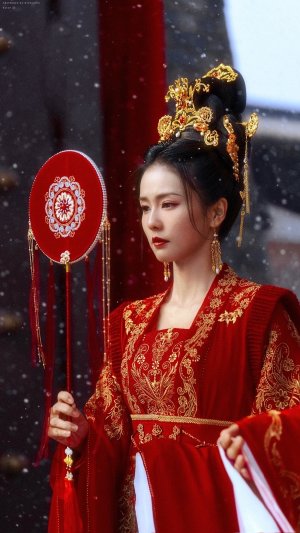This review may contain spoilers
Light, refreshing, witty, with intrigue and action
If there’s one thing The Guardians of the Dafeng proves, it’s that Dylan Wang is on a roll. Ever since I first saw him in Love Between Fairy and Devil, I’ve followed his work religiously, and he has yet to disappoint me. This show? Another masterpiece. It’s gripping, intelligent, and refreshingly light when it needs to be — an absolute joy to watch from start to finish.
What surprised me most was how much I adored the fact that romance is secondary at best in the plot. Coming from someone mostly into romance, I wasn’t sure what to expect, but Dylan’s versatility made sure I didn’t miss it.
Xu Qi’an is the kind of character that pulls you in — witty, self-assured without being insufferable, and always aware of the absurdity of his own circumstances. He’s got the confidence of a protagonist who knows he’s the smartest guy in the room but the humility to never take himself too seriously. It’s that balance that makes him so endearing, and the way he seemingly easily gathers allies — from the Bureau of Astronomy to the Guardians, officials, and even the imperial family — just proves how much of a magnetic force he is.
Speaking of allies, the chemistry between the cast is incredible. The Xu family dynamic? Chef’s kiss. They bicker like there’s no tomorrow, but when it comes down to it, they will stand by each other, even in the face of death.
I can’t talk that long without appreciating the supporting characters. Beyond the emotional bonds, the show also delivers on the action front, with each character bringing their own strengths to the battlefield. And when it comes to sheer presence, few can match Yang Yan. His fight scenes are pure cinema. The aura, the might, the majesty — every time he’s on screen, it’s impossible to look away. And let’s not forget Nangong Qian Rou, the only female Gold Gong. A total badass and the perfect blend between power and elegance.
Then there’s Mr. Wei, the leader of the Guardians, whose father-son relationship with Xu Qi’an adds so much depth to the story. Watching their bond evolve, the way Mr. Wei both guides and challenges him, is one of the many emotional anchors of the series.
One of my favorite things about this show is its ability to transition seamlessly from deeply philosophical discussions to the most absurdly trivial matters. One moment, we’re questioning justice, morality, and the law; the next, we’re dealing with some completely ridiculous, almost comedic situation. It’s this ability to strike a balance between depth and humor that makes the show so engaging.
My most emotional twist was Xi Qi’an’s trial, where he was charged for killing a Silver Gong — an act of justice that clashed with the very law he served. Mr. Wei, his mentor, was the one forced to hand down the sentence, torn between duty and the knowledge that Xu Qi’an had done the right thing. The weight of that moment, the tension in their gazes, the silent war between justice and the law — it was cinematic gold.
Xu Qi’an’s brilliance in solving the unsolvable cases made him a highly sought-after asset, with Gold Gongs even competing to have him on their team. The respect he earned throughout the series is palpable. Even characters like Li Yuchun, who started off distrusting him, by the time Silver Gong’s death trial comes around, were already standing up for him wholeheartedly.
A lot of people compare TGOTD to Joy of Life, but to me, the former stands on its own. It keeps things playful even when the stakes are high, whereas JOL— despite Fan Xian’s humor — carries a heavier sense of danger with its plot twists. TGOTD thrives on its witty exchanges, fast-paced storytelling, and engaging character dynamics, making it feel more like a thrilling yet fun ride. While danger is always present, the story never lingers too long in despair. Each twist feels exhilarating rather than angsty. The tension is real, but it never tips into the same level of dread that JOL sometimes reaches, keeping the ride fun and fast-paced.
What surprised me most was how much I adored the fact that romance is secondary at best in the plot. Coming from someone mostly into romance, I wasn’t sure what to expect, but Dylan’s versatility made sure I didn’t miss it.
Xu Qi’an is the kind of character that pulls you in — witty, self-assured without being insufferable, and always aware of the absurdity of his own circumstances. He’s got the confidence of a protagonist who knows he’s the smartest guy in the room but the humility to never take himself too seriously. It’s that balance that makes him so endearing, and the way he seemingly easily gathers allies — from the Bureau of Astronomy to the Guardians, officials, and even the imperial family — just proves how much of a magnetic force he is.
Speaking of allies, the chemistry between the cast is incredible. The Xu family dynamic? Chef’s kiss. They bicker like there’s no tomorrow, but when it comes down to it, they will stand by each other, even in the face of death.
I can’t talk that long without appreciating the supporting characters. Beyond the emotional bonds, the show also delivers on the action front, with each character bringing their own strengths to the battlefield. And when it comes to sheer presence, few can match Yang Yan. His fight scenes are pure cinema. The aura, the might, the majesty — every time he’s on screen, it’s impossible to look away. And let’s not forget Nangong Qian Rou, the only female Gold Gong. A total badass and the perfect blend between power and elegance.
Then there’s Mr. Wei, the leader of the Guardians, whose father-son relationship with Xu Qi’an adds so much depth to the story. Watching their bond evolve, the way Mr. Wei both guides and challenges him, is one of the many emotional anchors of the series.
One of my favorite things about this show is its ability to transition seamlessly from deeply philosophical discussions to the most absurdly trivial matters. One moment, we’re questioning justice, morality, and the law; the next, we’re dealing with some completely ridiculous, almost comedic situation. It’s this ability to strike a balance between depth and humor that makes the show so engaging.
My most emotional twist was Xi Qi’an’s trial, where he was charged for killing a Silver Gong — an act of justice that clashed with the very law he served. Mr. Wei, his mentor, was the one forced to hand down the sentence, torn between duty and the knowledge that Xu Qi’an had done the right thing. The weight of that moment, the tension in their gazes, the silent war between justice and the law — it was cinematic gold.
Xu Qi’an’s brilliance in solving the unsolvable cases made him a highly sought-after asset, with Gold Gongs even competing to have him on their team. The respect he earned throughout the series is palpable. Even characters like Li Yuchun, who started off distrusting him, by the time Silver Gong’s death trial comes around, were already standing up for him wholeheartedly.
A lot of people compare TGOTD to Joy of Life, but to me, the former stands on its own. It keeps things playful even when the stakes are high, whereas JOL— despite Fan Xian’s humor — carries a heavier sense of danger with its plot twists. TGOTD thrives on its witty exchanges, fast-paced storytelling, and engaging character dynamics, making it feel more like a thrilling yet fun ride. While danger is always present, the story never lingers too long in despair. Each twist feels exhilarating rather than angsty. The tension is real, but it never tips into the same level of dread that JOL sometimes reaches, keeping the ride fun and fast-paced.
Was this review helpful to you?


 1
1










